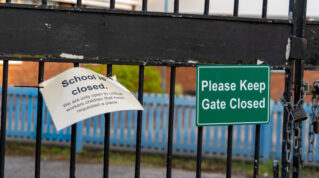Tutoring alone is insufficient to help pupils emerge from the collective trauma of the past year, writes Sue O’Brien
With news today of a vaccine on the horizon, it is clearer by the day that the situation of the past year is redeemable. But as we experience a second national lockdown, our children and young people continue to face disruption to their education and home lives.
The BBC recently reported that almost half of secondary schools in England had sent home one or more pupils due to Covid-19, and the Northern Powerhouse Partnership has now called for exams to be scrapped amid concerns that northern pupils were the most affected by ongoing disruptions.
In an attempt to counteract the disruption and in light of clear evidence from the first lockdown of a widening attainment gap, the government has launched its National Tutoring Programme. This is a welcome initiative, not only because pupils can make excellent progress in response to subject tutoring, but perhaps even more importantly because pupils in more disadvantaged areas, particularly in areas in the north of England, are less likely to be able to access high-quality tutoring.
In truth, though, tutoring alone is unlikely to be sufficient. In fact, in some cases it could even add to academic pressure. A study carried out in September 2020 by Young Minds, an organisation whose mission is to support children and young people’s mental health, showed that after the initial benefits of returning to school, seeing their friends and re-establishing routines, “the rapid return to academic pressure, after six months away, was having a negative impact”. Having experienced turbulent and often overwhelming experiences since March 2020, a one-size-fits-all approach to meeting the needs of children and young people will not be enough to help them all bounce back.
We knew these pupils would benefit from support from relatable role models
This is why, when we started discussing how we as a university could support young people as they began to re-engage with school we were convinced that any support we offered must be bespoke, validating and understanding their experiences of lockdown and building from there. It had to focus on the whole person and understand their specific needs.
We teamed up with the Northern Powerhouse Partnership and set up a mentoring programme with Class of 2020 undergraduates working directly with year 11 pupils in schools across South Yorkshire. Its aim: to help them to re-engage with learning, discuss their future aspirations and give them permission and motivation to think beyond Covid. On November 16, we begin our first cycle of support for ten schools across our region, employing 20 class of 2020 Sheffield Hallam graduates who will support 300 pupils over seven weeks.
We knew these pupils would benefit from support from relatable role models who had similar experiences and backgrounds. Our graduates do and, following an intensive training programme, provide individual mentoring that holds the pupils in a safe place to explore their short- and longer-term future and the support and skills to help them through the next steps.
Crucially, the schools themselves choose the pupils who will receive the support. Usual measures are used but are not definitive. We know that the schools know their pupils best – who has been most affected by lockdowns and ongoing disruption, and who will benefit most from focused mentoring.
The curriculum is designed to enable pupils to reconnect with education through the support of an enabling adult. It is founded on trauma-informed principles and supported by Trauma Informed Schools UK. Our mentors, recruited among recent Sheffield Hallam University and University of Sheffield graduates, coach pupils in habits and skills for learning as well as identifying areas for individual support. They encourage a view of the world beyond Covid, supporting the pupils to revisit and reimagine their aspirations for the future.
As we emerge from the collective trauma of the past year, the right support will ensure our young people find their way back on to the path to realising their ambitions and come back stronger. If our recovery is to be an equal one, that support must be local, bespoke, intelligence-led (not data-led) and broaden its scope beyond the immediately evident learning gaps.
















Your thoughts